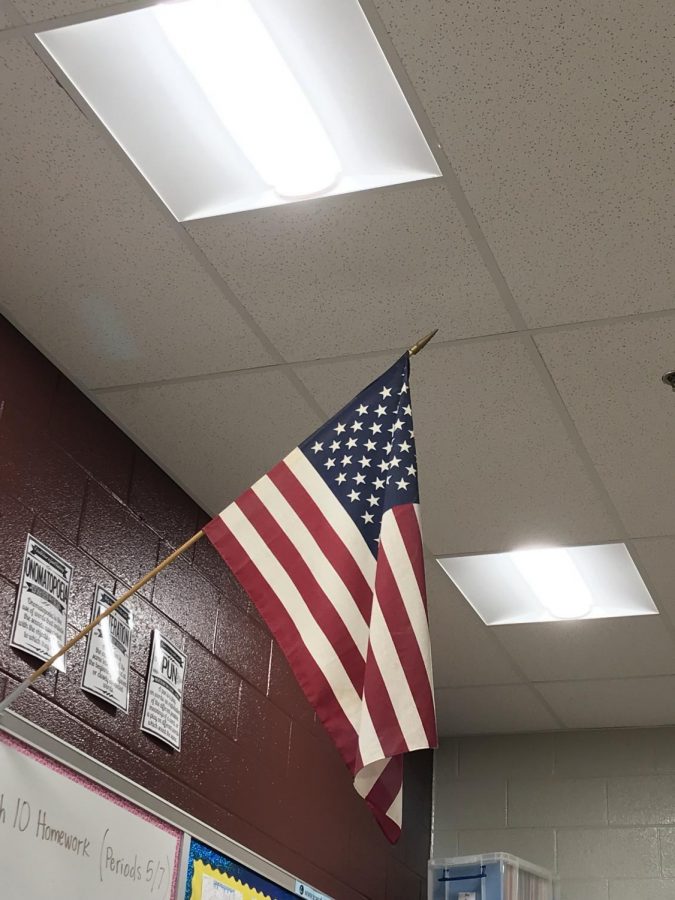Should We Stand for the Pledge of Allegiance?
Pictured is an American flag hanging in room E133.
November 23, 2021
“I pledge allegiance to the Flag of the United States of America, and to the Republic, for which it stands, one nation, under God, indivisible, with liberty and justice for all.” Whether you’re a student or a teacher at State High, you probably recite the same 31 words every morning at 8:40. But what do these words mean, and why do we recite them daily? Should we even say the pledge at all?
While some people may think that the Pledge of Allegiance has been around since the start of our country, like the national anthem, it is actually a relatively recent invention. The first version of the pledge was penned by Francis Bellamy, a socialist minister, in 1892, as an initiative to sell more flags. It read “I pledge allegiance to my Flag and the Republic for which it stands, one nation, indivisible, with liberty and justice for all,” making no mention of God or the United States.
The United States part was added in the 1920s, and the pledge was adopted by Congress in 1942. The addition of “under God,” perhaps the most controversial part, didn’t happen until 1954, during the Cold War, when America wanted to distinguish itself from the atheist Soviet Union. The pledge has remained unchanged since 1954.
Although no student is forced to say the pledge, some think that this tradition should not be in schools at all. One State High student, who prefers to remain anonymous, said that they don’t stand because they’re “not treated in America as equal to cishet [cisgender heterosexual] people. This country doesn’t like me.”
This is a common theme among people who refuse to stand, as some feel America doesn’t deserve that respect because it treats them or others without respect. The student also said they don’t stand for “religious reasons.” This is common among others who don’t say the pledge, due to the words “under God”, which may conflict with some people’s religion or lack of one.
The main reason some people don’t stand for or recite the pledge is typically that they believe that America does not provide “liberty and justice for all,” as it states. They refuse to say the pledge as a form of protest against whatever systemic injustice that they stand against. Refusing to stand for or say the pledge has been used to protest wars, racism, sexism, and many other systemic injustices that people stand against. Another reason people don’t say the pledge is a religious reason. Atheists and polytheists (those who believe in multiple gods) object to the “under God” part of the pledge, as they don’t recognize one god. Also, some Christian sects like Jehovah’s Witnesses cannot pledge their allegiance to anything besides God, and thus do not say the pledge.
Some students, however, believe that everyone should say the pledge. Sophomore Maxwell Wager stands and recites the pledge every morning. He encourages others to do so too.
“I think it should be up to personal decision. I would encourage and I think it gives thanks for the freedoms we have, but on the other hand, you can’t force anyone into it,” Wager said.
These sentiments are a common theme for those who stand for the pledge. They believe that America, although it may have flaws, is a good country and requires respect. Many people also say the pledge out of respect to American soldiers who have fought in the many wars America has been in.
Although opinions are split about whether people should stand for the pledge or not, it is good to have civilized discussions and listen to the other side.



Mike Rosoft • Jun 19, 2023 at 8:41 AM
I oppose the compelled recitation of the pledge (be it by law or peer pressure) as a matter of principle. A pledge should be said once when this is relevant, such as when taking a public office; and it should be said by somebody who knows what they are promising. It shouldn’t be repeated by rote.
I’d go as far as to say that the compelled recitation is tantamount to indoctrination. In addition, it teaches the wrong thing: that patriotism means displaying the flag and parroting patriotic phrases.
In my opinion, the quasi-religious recitation of the pledge is unconstitutional – it violates the ‘freedom of speech’ clause of the 1st amendment (just like prayer in public schools is unconstitutional, even if the students can opt out).
anonymous • Apr 30, 2023 at 11:00 PM
listen i don’t want to hear all your liberal comments and stuff. the flag stands for this country and the men and women that died for it. so if you don’t want to respect the flag then you can pack your bags and get out of here.
Anonymous • Jul 22, 2023 at 2:55 AM
1: you don’t own other’s opinions, they can comment whatever they want.
2: you may think that the flag stands for the soldiers this country has lost, but for some it stands for the government and the government oppresses everyone besides white men. just saying.
3: you don’t get to tell anyone that they can pack their bags and get out because you don’t own this country.
Daniel G Brough • Nov 11, 2022 at 2:06 PM
Here is my opinion. I do not believe anyone should be compelled to pledge allegience to a flag, any flag. I do not believe we should pledge allegience to a country stating liberty and justice for all, when its untrue. In yhd United States of America you get as much liberty and justice as you can afford. Most people can’t afford true liberty or justice in America. Saying so in a pledge is just wrong until the time comes that all people are treated equally. This isn’t a race issue. This is a class issue. And until a poor man with no formal education has an equal chance with a rich educated person to lead our country it never will be equal. The people with the most money and power are the ones elected to office as demonstrated by the election of Donald Trump. There will be no equality in our country until they find a way to do away with buying votes and influencing people either money. When the get the money and influence out of politics then we will have a chance at true equality.
Harper Lidermann • May 2, 2022 at 11:23 AM
I don’t think we should stand for the pledge (especially not as students.) I am a queer atheist woman, and I have no objection to anyones religion. I only object to it when they use it as am excuse for bigotry, which is heavily condoned in America. I get ridiculous questions about my gender and sexual orientation on the daily that I don’t think are appropriate, but this country doesn’t teach good manners to those outside the majority in any way.
The “under God” part is against the Soviet Union, thus is not truly a religious sentiment (an example of political propoganda being taught to children as young as PreK).
Matthew 5 34-37: 34 But I tell you, do not swear an oath at all: either by heaven, for it is God’s throne; 35 or by the earth, for it is his footstool; or by Jerusalem, for it is the city of the Great King. 36 And do not swear by your head, for you cannot make even one hair white or black. 37 All you need to say is simply ‘Yes’ or ‘No’; anything beyond this comes from the evil one.
Saying the pledge goes directly against that.
Raewyn • Feb 16, 2022 at 10:49 PM
I’m a Christian and my allegiance is to God. Not a flag, or nation, no matter which nation it is. God first. I can’t have it both ways. Inserting the words “Under God” doesn’t change what it is, because it could be the god of money for all I know.
Ally • Feb 23, 2022 at 11:12 AM
Exactly. So true.
Kaylie • Mar 1, 2022 at 9:13 AM
i don’t think so i think we should all stand for the pledge it tis giving thanks to those who fought for our freedom and it also gives thanks to God
Keon • Apr 20, 2022 at 4:27 PM
I can understand your viewpoint when you say, “(we) are giving thanks to those who fought for our freedom” but the Pledge of Allegiance says nothing about troops or those who served.
Cassie • Mar 8, 2023 at 11:32 AM
I understand what your saying but why would they put “under god” in the pledge. In the bible there is no say that god said we haft to stand or we haft to say the pledge. I feel like the U.S. made a rediculous law about this topic.